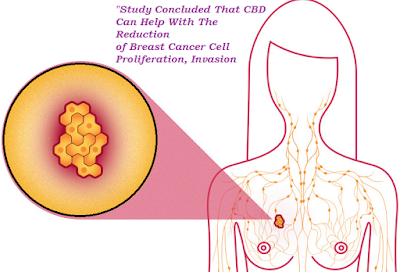The process of metastasis to other tissues of the body is the final and fatal step during cancer progression and is the least understood genetically.
Despite all currently available treatments, breast cancer is most often incurable once clinically apparent metastases develop.
It is well known that CBD can modulate specific functions of the immune system and the immune system has an important role in the inhibition of cancer progression.
It was essential to determine whether CBD demonstrates antitumor activity and since CBD has a low toxicity, it would be an ideal candidate for use in combination treatments with additional drugs already used in the clinic.
The experiments described in this manuscript not only define the pathways that CBD is working through to control breast cancer cell aggressiveness, but also demonstrate the efficacy of CBD in pre-clinical models. A greater understanding of this system may lead to future therapies for breast cancer patients, including the additional refinement of CBD analog synthesis.
The Study...
Researchers reported that cannabidiol (CBD), a cannabinoid with a low toxicity pro-file, down-regulated Id-1 gene expression in aggressive human breast cancer cells in culture. Id-1, an inhibitor of basic helix-loop-helix transcription factors, has been reported to be dysregulated in over 20 types of cancer, and suggested as a key determinant of tumorigenesis and/or metastasis in a wide range of tissues, including the breast cancer.
Using cell proliferation and invasion assays, we determined pathways leading to the down-regulation of Id-1 expression by CBD and consequently to the inhibition of the proliferative and invasive phenotype of human breast cancer cells.
Two different syngeneic models of tumor metastasis to the lungs were chosen to determine whether treatment with CBD would reduce metastasis 'in vivo'.
Researcers show that CBD inhibits human breast cancer cell proliferation and invasion through differential modulation of the extracellular signal-regulated kinase (ERK) and reactive oxygen species (ROS) pathways, and that both pathways lead to down-regulation of Id-1 expression.Moreover, they demonstrate that CBD up-regulates the pro-differentiation factor, Id-2.
Conclusion...
-That treatment with CBD significantly reduces primary tumor mass as well as the size and number of lung metastatic foci in two models of metastasis. Our data demonstrate the efficacy of CBD in pre-clinical models of breast cancer.
-Importantly, CBD appears to be interacting through a cellular system that regulates the expression of key transcriptional factors that control breast cancer cell proliferation, migration, and invasion.
-The results have the potential to lead to the development of novel non-toxic compounds for the treatment of breast cancer metastasis, and the information gained from these experiments broaden our knowledge of both Id-1 and cannabinoid biology as it pertains to cancer progression.
Source:Breast Cancer Res Treat. available in PMC 2012 Aug 2.


No comments:
Post a Comment